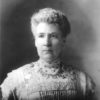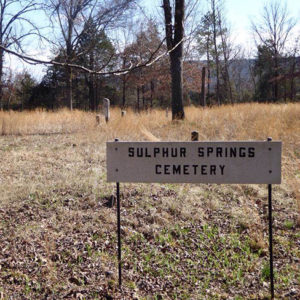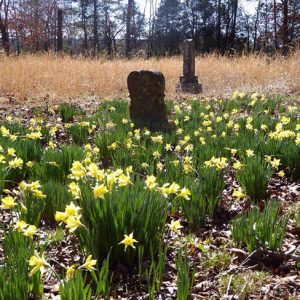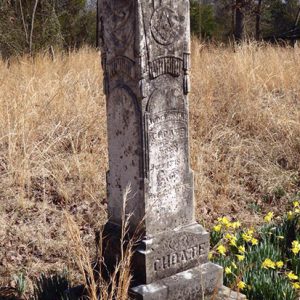calsfoundation@cals.org
Sulphur Springs Cemetery
The Sulphur Springs Cemetery in Yell County, considered a historical resource, was placed on the National Register of Historic Places on February 21, 2012, under multiple criteria, including Criterion C and Criterion D, for the designation of burial places. Among many unmarked fieldstones, the cemetery holds the remains of Judge John F. Choate, a prominent community member who served as Yell County circuit clerk and Yell County judge. The cemetery is one of the only surviving structures from the region’s days as a medicinal resort destination.
In the early to mid-1800s, Sulphur Springs (Yell County) was known throughout the United States for its healing waters, which contained minerals such as white and black sulfur, soda, and chalybeate. Spas were popular across the country, including White Sulphur Springs in West Virginia and Saratoga Springs in New York, as well as several in Arkansas. Despite the remote location, the resort was known from New Orleans, Louisiana, to Boston, Massachusetts, and the healing waters were rumored to treat kidney and stomach ailments, rheumatism, dropsy, scrofula, and dyspepsia.
Visitors to the springs would typically take a steamboat up the Arkansas River and arrive in the river port town of Dardanelle (Yell County) or at the Dardanelle Rock. From there, they would take a hike twelve miles through the woods to reach the resort. The exact date of the discovery of the springs is unknown, but a small resort was established there as early as 1839. During the Civil War, area structures were burned by the Union cavalry, but a new hotel was built in 1867. According to the National Register nomination form: “Stockholders from Little Rock, Memphis, New Orleans and Brooklyn invested in the new resort.” By 1872, the New York Trust Company took over the springs, and New York railroad man Colonel William P. Denckla rebuilt the hotel and the outbuildings, investing a great deal of outside money into the little community.
By 1879, Sulphur Springs had a post office, and the hotel itself encompassed an entire block. In 1901, the land was purchased by Choate, who played a large role in regional history. Born in Tennessee, he moved to nearby Chickalah (Yell County) in 1850. He became circuit clerk in 1865 when he was in his twenties. He held the position for eight years and was then elected Yell County judge in 1876, serving two terms until 1880. He worked as a planter; was a member of the firm Choate, Foweler and Martin; and established the first general store in Belleville (Yell County). He also created the Belleville Academy in 1873. Known for his philanthropic spirit, he eventually gave the springs over to the public. He died in 1903.
By the 1920s, the springs themselves began to fall into disrepair. The Sulphur Springs School consolidated with Dardanelle in 1930, and elementary students were sent to the nearby Chickalah School, which further depleted the community. Today, little remains of the spring’s heyday.
Many of the early graves are unmarked fieldstones. The earliest known burial in the cemetery is that of Joseph Waite (often known by locals as “Wattie”), a patient at the resort who died in 1844. According to the National Register nomination form, “the funerary architecture is simple and many are vernacular adaptations from the post-Victorian era.” Choate’s is the largest gravestone in the cemetery. The locally based Sulphur Springs Cemetery Association engages in a yearly cleanup of the cemetery grounds.
For additional information:
Banks, Wayne. History of Yell County, Arkansas. Van Buren, AR: The Press Argus, 1959.
“Sulphur Springs Cemetery.” National Register of Historic Places nomination form. On file at Arkansas Historic Preservation Program, Little Rock, Arkansas. Online at http://www.arkansaspreservation.com/historic-properties/_search_nomination_popup.aspx?id=2612 (accessed October 19, 2021).
Yell County Historical and Genealogical Association. Yell County Heritage: A History of Yell County, Arkansas. Bedford, TX: Curtis Media, Inc., 1997.
Meredith Martin-Moats
McElroy House: Organization for Folklife, Oral History and Community Action
 Historic Preservation
Historic Preservation Post-Reconstruction through the Gilded Age, 1875 through 1900
Post-Reconstruction through the Gilded Age, 1875 through 1900 Sulphur Springs Cemetery
Sulphur Springs Cemetery  Sulphur Springs Cemetery
Sulphur Springs Cemetery  Sulphur Springs Cemetery
Sulphur Springs Cemetery 




Comments
No comments on this entry yet.